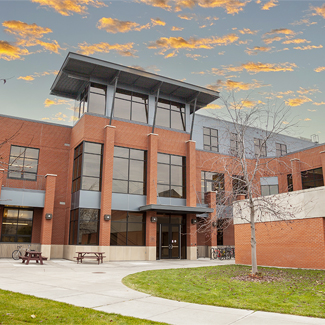Course Schedule
Field Course: Indian Country Summer Indigenous Peoples and Indian Law Program 2024

We're offering a place-based experiential learning opportunity again this summer! Please stay tuned for details.
This course will be taught in partnership with the Freeflow Institute, a Montana-based collaborative offering structured, professionally catered trips in wild spaces. Freeflow helps to infuse academic courses with creative outdoor learning.
Space is limited, and applications are due no later than May 31, 2024. Find details on how to apply on our registration page, and read more about the course in the description below. The full itinerary and logistical information will be available on Freeflow's website.

2024 Course Descriptions
Instructor:
Mylinn Smith
Managing Attorney
CSKT Tribal Prosecutors Office
This course looks at fundamental aspects of American Indian law and provides a basic understanding of core Indian law principles, both on the federal and tribal level. The course familiarizes participants with the development of foundational concepts in the area of Indian law and addresses the continuing impact of federal legislation and court actions on tribal governance structures and principles of sovereignty. In addition to providing substantive information on legal principles associated with American Indian law, participants will engage in practical skill-building exercises that build upon the substantive materials being covered.
Asynchronous Online Course
Instructor:
Professor Kekek Stark
Alexander Blewett III School of Law
University of Montana
Because tribes are sovereign governments, the field of Indian Law encompasses distinct legal issues and legal sources. Researching both federal Indian law (the law of the relationship between tribal governments and the U.S. government) and tribal law (the law of individual tribes) requires an additional set of tools and research skills to those students are introduced to in a basic legal research course. In this course, students will learn the skills and sources necessary to research general Indian law issues as well as the very specialized skills and sources used in researching the legal history of a tribe, including reserved treaty rights. The course will cover researching treaties, Indian land claims, statutory and case law, and tribal law. Students will actively participate in creating a tribal legal history throughout the course.
Field Course: Location Salmon and Lochsa River Systems (in conjunction with The Freeflow Institute)
Instructors:
Professor Michelle Bryan
Alexander Blewett III School of Law
University of Montana
Professor Monte Mills
University of Washington School of Law
This place-based learning experience focuses on the Salmon and Lochsa River systems and the myriad natural resource, environmental, governmental, legal, policy, and practical issues embedded in this region. We approach these issues by immersing ourselves in the place and working to understand the ways in which law and policy interact with it. Aside from the course faculty, students will hear from tribal representatives, private conservationists, federal land managers, and other stakeholders involved in management of the Nez Perce region. Themes explored include the myth and reality of public lands; wildlife management across jurisdictions; water law; cooperative management; and the intersection of tribal rights, sovereignty, and interests with federal, state, and private interests—both historical and continuing.
Instructor:
Courtney Allensworth Esposito
Supervisory Indian Probate Judge
Probate Hearings Division
United States Department of the Interior
This course will focus on the historical policies behind, and the current provisions of, the American Indian Probate Reform Act. In particular, the Act's creation of the first federal Indian probate code, testate and intestate succession laws applicable to federal trust realty and personalty, land consolidation opportunities for individuals and tribes, and tribal probate code development. Additionally, this course will explore estate planning options that individual trust landowners can use to control and distribute their trust lands during their lifetime and through the probate process.
Instructor:
Dean and Professor Kevin Washburn
University of Iowa College of Law
This course examines tribal co-management issues associated with public land management and regulation. The subject matter of the course will take an in-depth analysis of select tribal co-management examples along with the regulatory infrastructure to effectively implement tribal co-management on public lands.
Instructor:
Professor Dan Lawerenz
University of North Dakota School of Law
Treaties and statutes are critical instruments in federal Indian law. We will begin with a study of treaties: how they become law, how courts interpret them, and how the Indian context affects both formation and interpretation. Next, we will study statutes: how they become law, how courts interpret them, and how the Indian context affects both formation and interpretation. Of particular interest are federal Indian law’s many negotiated statutes—which in some ways resemble treaties, and in other ways resemble statutes. Students who complete the course will be better equipped to interpret treaties and statutes both generally and in federal Indian law.
Instructors:
Professor Jordan Gross
University of Idaho College of Law (Boise Campus)
Director, Rural Justice Initiative, Alexander Blewett III School of Law
University of Montana
Ann Miller
Managing Attorney
CSKT Tribal Defenders Office
Maylinn Smith
Managing Attorney
CSKT Tribal Prosecutors Office
Additional Guest Instructors TBA
Assimilationist federal policies and resource constraints have required or incentivized Indian Nations to organize their criminal codes and justice systems around Anglo-American justice norms. Many Tribes have found this approach to be ineffective in protecting public safety in their communities, misaligned with their justice traditions, and incompatible with their sovereignty interests. To better meet their community's needs, some Tribes have re-centered their approach to addressing harmful conduct on non-carceral, restorative, community-based principles. In 2023, the United States had the sixth highest incarceration rate in the world. State and federal policymakers and court systems seeking to reduce these numbers often look to Tribal initiatives as models for reform. This course examines contemporary holistic, interdisciplinary, collaborative Tribal approaches to wrongdoing, and explores whether these reforms are translatable to settler-colonial criminal justice systems. The Wednesday class is a full day field learning session in Pablo on the Flathead Indian Reservation. The field session will include a visit to the Confederated Salish Kootenai Tribes (CSKT) Tribal Court, CSKT Tribal Defenders Office, and CSKT Tribal Prosecutors Office. Transportation is provided between Missoula and Pablo.
Instructor:
Wesley Furlong
Senior Staff Attorney
Native American Rights Fund
This course focuses on the contemporary legal protection of Indigenous cultural resources, and the role of the law in protecting Indigenous cultural heritage. Following completion of the course, students will understand the Tribal Cultural Resource law. This course specifically focuses on NHPA and the Section 106 process, ARPA, NAGPRA, and the Antiquities Act, and will also cover over laws related to cultural resource protection, including NEPA, RFRA and the First Amendment, Section 4(f) of the Department of Transportation Act, among others.
Instructor:
Professor Anna Conley
Alexander Blewett III School of Law
University of Montana
This course will focus on indigenous rights from an international human rights perspective. It will compare how indigenous communities in different countries have utilized indigenous rights as an international human right to advocate for rights within domestic legal frameworks.
